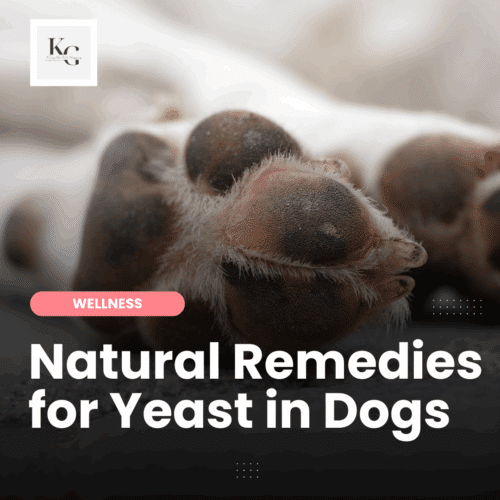Keep the Tail Wagging is supported by pet parents. I occasionally earn a commission (at no additional cost to you) when you click through an affiliate link to one of my favorite products. Thank you for your support. Read More
I've been reading about the benefits of Manuka honey for years, but I haven't considered trying it out with my dogs until recently. Manuka honey is lauded for its exceptional health benefits and stands out among various types of honey for its unique properties and potent healing abilities. This article delves into the intricacies of this golden elixir, shedding light on its origins, benefits, uses, dosage recommendations, and potential risks.
Comparing Manuka and Local Honey
Manuka honey isn't cheap. I can buy local honey down the road for a fraction of the cost. So, what's the difference between Manuka honey and local (found in my area) honey? In my research, I learned Manuka honey and local honey differ significantly in their composition, origin, production process, and health benefits. Here are the key differences between Manuka honey and local honey:
1. Plant Source:
- Manuka Honey: Manuka honey comes from the nectar of the Manuka bush (Leptospermum scoparium), which is native to New Zealand and parts of Australia. The manuka bush's unique properties contribute to its distinctive qualities.
- Local Honey: Local honey, also known as clover honey, wildflower honey, or multifloral honey, is derived from various flower nectars and does not come from specific plant species like Manuka honey.
2. Unique Chemical Compounds:
- Manuka Honey: Manuka honey contains high levels of methylglyoxal (MGO) and dihydroxyacetone (DHA), compounds responsible for its potent antibacterial and antioxidant properties. These compounds are unique to Manuka honey and contribute to its therapeutic benefits.
- Local Honey: Local honey does not typically contain as high concentrations of MGO or DHA as Manuka honey, which is why it may not offer the same level of antibacterial and health-promoting properties.
3. Grading System:
- Manuka Honey: Manuka honey is graded using the Unique Manuka Factor (UMF) rating system, which assesses the honey's quality, purity, and potency. A higher UMF rating indicates a higher level of beneficial compounds in the honey.
- Local Honey: Local honey may not have a standardized grading system like Manuka honey, making it challenging to assess its quality and potential health benefits based on a specific rating.
4. Therapeutic Benefits:
- Manuka Honey: Due to its high antibacterial, antimicrobial, and anti-inflammatory properties, Manuka honey is often used for wound healing, skin care, digestive health, and immune support. It is considered a natural remedy with a range of health benefits.
- Local Honey: While local honey also offers some health benefits, such as soothing sore throats and providing energy from natural sugars, it may not possess the same level of therapeutic effects as Manuka honey.
5. Price Point:
- Manuka Honey: Manuka honey is typically more expensive than regular honey due to its unique properties, limited production regions, and specific grading standards.
- Local Honey: Local honey is more widely available and tends to be more affordable compared to Manuka honey.
While both Manuka honey and local honey are nutritious and versatile foods, Manuka honey stands out for its exceptional properties, specialized production process, and documented health benefits. Choosing between the two depends on individual preferences, intended uses, and desired health outcomes.
Quality Indicators of Manuka Honey
When seeking a quality Manuka honey product, consumers should look for the Unique Manuka Factor (UMF) certification and rating, which indicates the honey's authenticity, potency, purity, quality, and shelf-life. A UMF rating of 10 or above is considered beneficial for therapeutic use.
Manuka honey does change based on the UMF rating and MGO level. For example, a higher UMF rating lends to a honey product that is darker in color and has a tangy flavor.
Manuka Honey Dosage Recommendations
Manuka honey is safe to use externally and internally with our dogs and on ourselves.
Topical Application
Apply Manuka honey directly to wounds, burns, or skin conditions for healing and soothing wounds.
- Dilute Manuka honey with water and wash the wound with it, leaving some of the mixture on the wound to soak in.
- Apply pure Manuka honey directly on top of the wound.
- Cover it with a clean, non-adhesive bandage.
- Change the dressing as needed.
- Use a cone to prevent meddling if necessary.
Oral Consumption
Manuka honey can be added to your diet by mixing it into tea or yogurt or consuming a spoonful daily for overall health benefits. One to two tablespoons of Manuka honey daily is recommended. Higher doses may be necessary for therapeutic purposes, such as immune support, but it's advisable to work with a holistic healthcare provider for personalized recommendations.
For dogs, Manuka honey can be mixed with warm water, treats, or fed straight from a teaspoon. I found guidelines that recommend 1/4 to 1/2 teaspoon per 20 pounds of body weight, once or twice daily, starting with smaller amounts and slowly increasing the dose.
Risks of Manuka Honey
While Manuka honey is generally safe for most people, individuals with allergies to bees or honey should exercise caution. As with local honey, Manuka honey isn't recommended for puppies or pregnant dogs. It's also important to keep the higher sugar content of honey when adding it to your dog's diet.
There is a belief that using general cutlery destroys the enzymes in honey, but I haven't found any studies that support this. What I have read warns against using copper or iron spoons in honey, but normal household cutlery is considered safe to use by beekeepers. I would never allow a spoon to sit in honey for an extended period.
Manuka honey is a versatile natural remedy with various health benefits, making it a valuable addition to any wellness regimen. By understanding its properties, sourcing quality products, and consuming it in moderation, individuals can harness the therapeutic potential of this extraordinary honey for improved health and well-being.
After my research, I decided to give it a try. I ordered a container of honey from Manuka Health. I was impressed by the positive reviews, which shared both the delicious flavor (I love honey in my tea) and healing properties. And I've been using a topical pet product by HoneyCure. It's expensive but effective.






